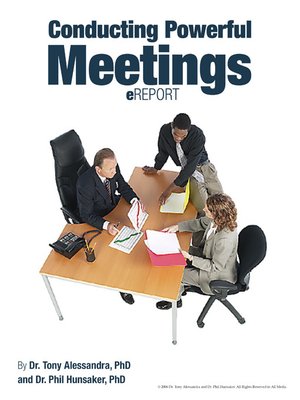
Sign up to save your library
With an OverDrive account, you can save your favorite libraries for at-a-glance information about availability. Find out more about OverDrive accounts.
Find this title in Libby, the library reading app by OverDrive.



Search for a digital library with this title
Title found at these libraries:
| Library Name | Distance |
|---|---|
| Loading... |
Do you approach a meeting expecting just another annoying waste of time? Do you walk away from it wondering why you wasted your time? If so, you know first hand how frustrating inefficient meetings are. Most managers spend 25-30% of their time in meetings and studies show that the average cost of a meeting runs over $1,000. Meetings are currently the most expensive communication activity in the corporate world — more costly than word processing, computers, paperwork, or multitudes of phone calls. Consider the salaries of those in attendance, preparation costs, travel expenses, and the price of materials, facilities, and equipment used during the meeting. Even if an organization conducted only two meetings a week, the total annual cost for those gatherings would run well over $100,000. Perhaps even more costly than the loss of time and money is the reduced morale that happens when people are forced to sit through boring, poorly planned, and badly conducted meetings. When unproductive meetings occur regularly, people with demanding schedules begin to avoid attending. Yet, these are the very individuals whose participation may be most important. When meetings are well managed, they are effective and essential tools for communication within the organization. This 16-page eReport will show you how to plan, conduct and follow-up on meetings. Meetings do not have to be a waste of time. When well planned and implemented, they offer enormous benefits. Topics covered include: Guidelines for effective meetings; Preparing for an effective meeting; Determining the purpose of the meeting; Setting meeting objectives; Selecting meeting participants; Planning the meeting agenda; Managing the energy cycle; Setting the time and place of the meeting; Dynamic meeting leadership; Encouraging participation and problem solving; Reaching decisions; Ending the meeting; Post meeting follow-up; Being able to conduct a meeting effectively is a critical communication skill. The benefits of a well-planned and conducted meeting are enormous: identification of solutions to problems, shared ideas and information, development of action plans that have group commitment, and improved team cohesiveness and morale.







